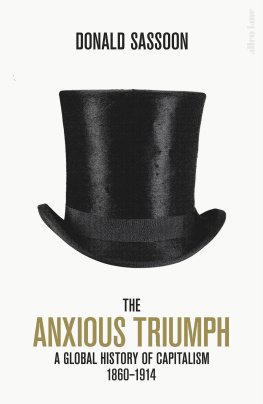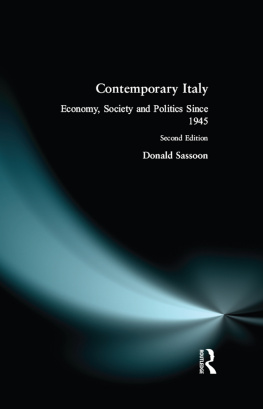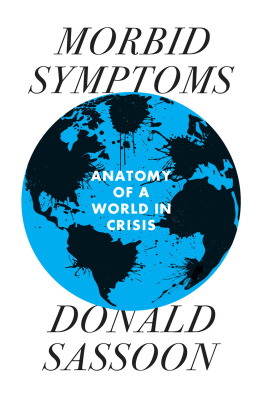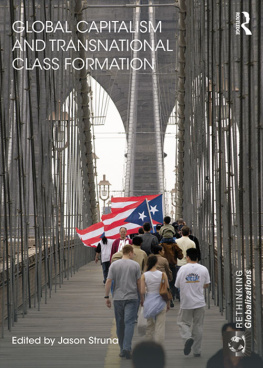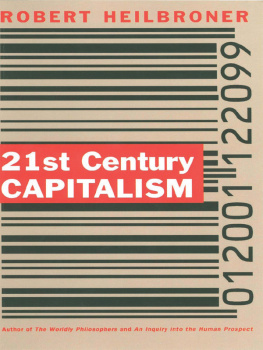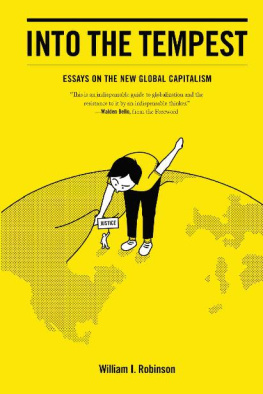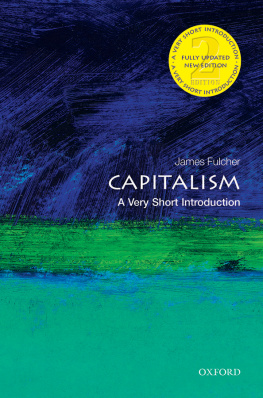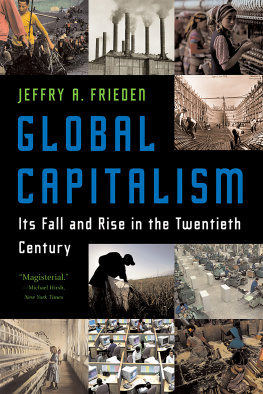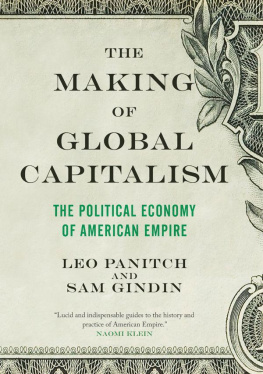

Donald Sassoon
The Anxious Triumph
A Global History of Capitalism, 18601914

Contents
About the Author
Donald Sassoon is Emeritus Professor of Comparative European History at Queen Mary, University of London. His previous books include One Hundred Years of Socialism (1996), Mona Lisa (2001) and The Culture of the Europeans (2006), all widely translated. He gives lectures at universities and conferences all over the world.
For Marina.
All successful social systems appear to be alike; each unsuccessful social system appears to be unsuccessful in its own way (with thanks to Tolstoy)
Acknowledgements
My thanks go to Marina Lewycka for reading the manuscript carefully, advising, editing, encouraging, disagreeing and agreeing, and everything else; Lauro Martines, a wise man, for reading the manuscript and offering wise advice; Paul Auerbach for doing the same; Candida McDonogh for her brilliant editing; Richard Mason for his brilliant copyediting; Toby Mundy, of course, as well as Stuart Proffitt; the Maison des Sciences de lHomme for having me in Paris almost every year; the Leverhulme Trust for a grant enabling me to take a years leave of absence; the University of Padua for a visiting professorship in 2017; the British Library and the Bibliothque Nationale de France.
List of Tables
| Sovereign States in the World, 1900 |
| States in Sub-Saharan Africa, 2019 |
| European States, 2019 (42 States) |
| Urban Population as a Percentage of Total Population |
| Weekly Per Capita Consumption, 18601913 |
| Life Expectancy at Birth in Selected European Countries |
| Infant Mortality Rate in Selected Countries, 18811911 |
| Per Capita GDP in Some European Countries and the USA, 18701913 |
| Per Capita GDP in Some European Countries and the USA, 1950 |
| League Table of Industrial Development, 18101910 |
| The Spread of the Suffrage for General Elections before 1914: Selected Countries |
| USA Presidential Election, 1912 |
| Western Countries Colonial Acquisitions, 18801914 |
| Extra-European Territory Held by European Powers |
| Independence from the United Kingdom of Colonies and Protectorates |
| Per Capita Gross National Product in Europe, 18701910 |
| Industrialization Levels Per Capita, 18601913 |
| Relative Wages in Engineering, 18501905 |
| Exports per Inhabitant, 18401910 |
| Protective Tariffs, c. 18751913 |
Introduction
Globalization is the name we currently give to the progressive integration of the world, a process that started centuries go. It denotes not only a massive expansion of trade and production but also a remarkable and unprecedented growth and convergence in consumption. Increasingly, we buy similar products, eat similar food (hamburgers, pizzas, sushi, pasta, fries, Chinese food, curries, tacos, couscous), drink the same beverages (cola, coffee, tea, beer), wear the same clothes (jeans, T-shirts, sneakers) with the same brands (Levis, Quicksilver, Nike, etc.), read the same best-sellers (J. K. Rowling, Dan Brown, Ken Follett), listen to similar music, and watch the same kind of television programmes.
Underpinning this worldwide system is an equally global ideology, market capitalism, which no longer needs defending, though it is constantly attacked. In its western heartland, no significant countervailing force opposes capitalism. In the rest of the world, opposition is muted. In the emerging economies of China, Brazil, and India there is little opposition to capitalism per se; public debate centres on the variety of capitalism that should prevail. Islamic fundamentalism, seen by some as the remaining challenger of the so-called new world order, has little to say about the economy.
The aim of this book is not to revisit the initial stages of capitalism, but to investigate the period between the second half of the nineteenth century and the Great War, when capitalism triumphed and became universally accepted, when most of its opponents acknowledged that it was inevitable, perhaps even desirable. It will examine how the elites responded to the challenge of industrial capitalism and how industrial progress could be achieved while keeping dissent to a minimum by creating a sense of national community, or a patriotic spirit, or using the state to regulate capitalism, or by conquering new territories.
In the eyes of many liberal ideologues the profit-maximizing entrepreneur was and is the real hero of capitalist development. He battles against politicians, bureaucrats, petty legislation, uppity workers and voracious trade unions. He identifies a sought-after demand; he works out how to satisfy it; he develops new production methods, thus increasing productivity; he bullies or begs banks into lending him money for investment; or he risks his own family fortune or his own hard-earned savings. Finally, having created jobs for a usually ungrateful workforce and having satisfied customers who did not know they needed something, he finds he has to protect his rightfully earned gains from the rapacious hands of the tax collector. Thanks to this entrepreneur and him alone, society and civilization have moved one small step forward towards happiness and prosperity. He is, above all others, the real creator of real wealth.
This is, of course, a free-enterprise fantasy, almost on a par with that held by anti-capitalists of yore, for whom capitalists were sleazy, heartless, cigar-chomping, arrogant, callous, money-obsessed rich thugs, devoid of human decency and delighted to grind the faces of the poor (to use a biblical expression, see Isaiah 3:15).
In reality entrepreneurs, like workers, come in all shapes and sizes. They do not have a single aim, do not speak with a single voice, have no unified political strategy. Some try to obtain as much as possible from the state; others are not interested; most hate politicians and politics but need them; and most assume that their interests are the same as those of the wider collective. Politicians agree, for it does not require great perception and intuition to see that prosperous capitalism is better than failed capitalism: more jobs, more money, more taxes, more consensus.
Capitalism is a process difficult to define since the presence of a few capitalists and of a few capitalist enterprises does not make a society capitalist. That what we call the Industrial Revolution started in the United Kingdom is uncontroversial. What is controversial is when capitalism started. Processes, unlike wars and regimes, do not start on a precise date. There were people one might call capitalists well before one could speak of an industrial revolution. Imagine, for instance, a weaver in ancient Mesopotamia, who hires workers, provides them with the tools and the raw materials, and pays them a salary. This entrepreneur would be recognized by Karl Marx himself as a capitalist since he owns the means of production (the capital), pays wages to his workers, and derives what Marx would have called surplus value from selling the cloth, yet no one would say that ancient Mesopotamia was a capitalist economy, even though there were 13,200 weavers in its main city, Ur, in c. 2000 BC at the time of the third Sumerian dynasty; the basis of the economy was in agriculture, and trade and production were mainly in luxury goods such as terracotta plaques.
Next page
